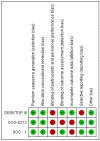Surgery in Recurrent Ovarian Cancer: A Meta-Analysis
- PMID: 37444580
- PMCID: PMC10340282
- DOI: 10.3390/cancers15133470
Surgery in Recurrent Ovarian Cancer: A Meta-Analysis
Abstract
Background: The second cytoreductive surgery performed for a patient who has recurrent ovarian cancer remains controversial. Our study analyzes overall survival (OS) and disease-free survival (DFS) for cytoreductive surgery in addition to chemotherapy in recurrent ovarian cancer instead of chemotherapy alone. Methods: A meta-analysis was conducted using PubMed and the Cochrane database of systematic reviews to select randomized controlled studies. In total, three randomized studies were used, employing a total of 1249 patients. Results: The results of our meta-analysis of these randomized controlled trials identified significant differences in OS (HR = 0.83, IC 95% 0.70-0.99, p < 0.04) and DFS (HR = 0.63, IC 95% 0.55-0.72, p < 0.000001). A subgroup analysis comparing complete cytoreductive surgery and surgery with residual tumor achieved better results for both OS (HR = 0.65, IC 95% 0.49-0.86, p = 0.002) and DFS (HR = 0.67, IC 95% 0.53-0.82, p = 0.0008), with statistical significance. Conclusions: A complete secondary cytoreductive surgery (SCS) in recurrent ovarian cancer (ROC) demonstrates an improvement in the OS and DFS, and this benefit is most evident in cases where complete cytoreductive surgery is achieved. The challenge is the correct patient selection for secondary cytoreductive surgery to improve the results of this approach.
Keywords: disease-free survival; meta-analysis; overall survival; recurrent epithelial ovarian cancer; secondary cytoreductive surgery; systematic revision.
Conflict of interest statement
The authors declare that they have no competing interest.
Figures





References
-
- Tian W.J., Chi D.S., Sehouli J., Tropé C.G., Jiang R., Ayhan A., Cormio G., Xing Y., Breitbach G.P., Braicu E.I., et al. A risk model for secondary cytoreductive surgery in recurrent ovarian cancer: An evidence-based proposal for patient selection. Ann. Surg. Oncol. 2012;14:597–604. doi: 10.1245/s10434-011-1873-2. - DOI - PubMed
-
- Winter W.E., 3rd, Maxwell G.L., Tian C., Carlson J.W., Ozols R.F., Rose P.G., Markman M., Armstrong D.K., Muggia F., McGuire W.P., et al. Prognostic Factors for Stage III Epithelial Ovarian Cancer: A Gynecologic Oncology Group Study. J. Clin. Oncol. 2007;25:3621–3627. doi: 10.1200/JCO.2006.10.2517. - DOI - PubMed
Publication types
LinkOut - more resources
Full Text Sources

